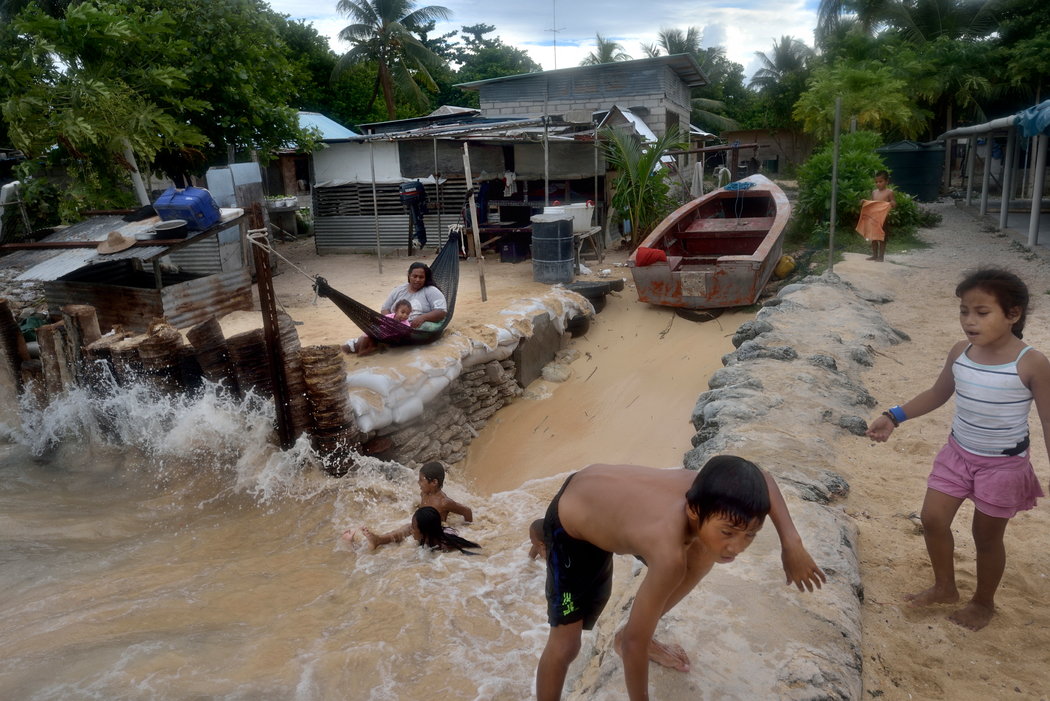Kiribati, a collection of 33 coral atolls located in the middle of the vast Pacific Ocean, not unlike that tropical paradise that graces your laptop screen saver.
It embodies that holiday you dream of taking one day. Nothing but coconut palms swaying in the island breeze, turquoise blue waters and white sandy beaches, sigh… You wouldn't have a care in the world if only you were in Kiribati.
Or would you?
Beneath the facade of paradise, Kiribati is bracing itself for an unstoppable force; climate change. The low lying nature of the atolls that straddle the equator between Australia and Hawaii, make them awfully prone to rising sea levels, king tides and storms. At the highest point, the ground above sea level is just 3 metres. It is effectively ground zero for climate change. What we are witnessing in Kiribati is the beginning of what the UN's Intergovernmental Panel on Climate Change indicated would happen to coastal and low lying areas by 2100. They predicted a rise in sea levels of up to 59cm on 1980 - 1999 averages and that these levels would effectively wash away entire cities, and in this case, an entire country.
With the country already seeing some levels of submersion on most of its islands, the President of Kiribati, Anote Tong, released a statement on August 13 calling on those 190 countries expected to meet in Paris in December of this year to make a commitment to phase out coal.
Read more: President of Kiribati calls for global moratorium of coal

Image: The New York Times
“The urgency of the issue cannot be emphasized enough. We are now facing major challenges never faced before not only from the rise in sea levels, but also from the real possibility of changes in weather patterns”- President Tong
President Tong is so concerned about the issue, that he has purchased land in Fiji where he is slowly resettling his people as he estimates his country has just 20 years left before it disappears from the face of the earth.
What does this all have to do with us back here in the land down under? Well, on average Aussies contribute 16.5 tonnes of carbon dioxide per capita into the atmosphere, in comparison a local I-Kiribati (the term for a resident of the region), just 0.6 tonnes. It seems criminal that we get to have all the fun of a fossil fuel driven society, yet we really don't feel many of the consequences. All the while our Pacific neighbours' farewell the land of their forefathers as it gets washed into the abyss.
The question we face is, what can we do?
Our government has made some pretty lousy commitments to emission reductions recently, a 26 to 28 per cent cut to emissions by 2030, based on 2005 levels. This target is weak for two reasons, firstly 2005 was an exceptionally high year for emissions so by making this the base year, it is effectively easier to achieve the target. Secondly, this target puts us behind many of the other nations due to meet in Paris later this year. If these commitments are not improved upon, (The Climate Change Authority recommended emissions be slashed between 45% to 65% by 2030, based on 2005 levels) then not only will Australia remain the highest per capita emitter in the industrialised world, but it will also seal the fate of low lying countries like the idyllic Kiribati. So if someday you hope to sip out of a coconut on the sandy shores of the island nation, you have got to do something. Leave the car at home, say no to single use plastic items, buy locally grown food, shop vintage, turn the power off, make your voice heard and attend any of the climate rallies taking place this year to let our government know that further reductions in emissions are essential. From little things, big things grow and everything we do today will help Kiribati tomorrow.
READ THIS NEXT: Why is coal such a big issue?
What would you like to see happen at the UN's conference in Paris later this year? Let us know in the comments section below.

